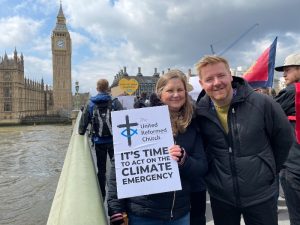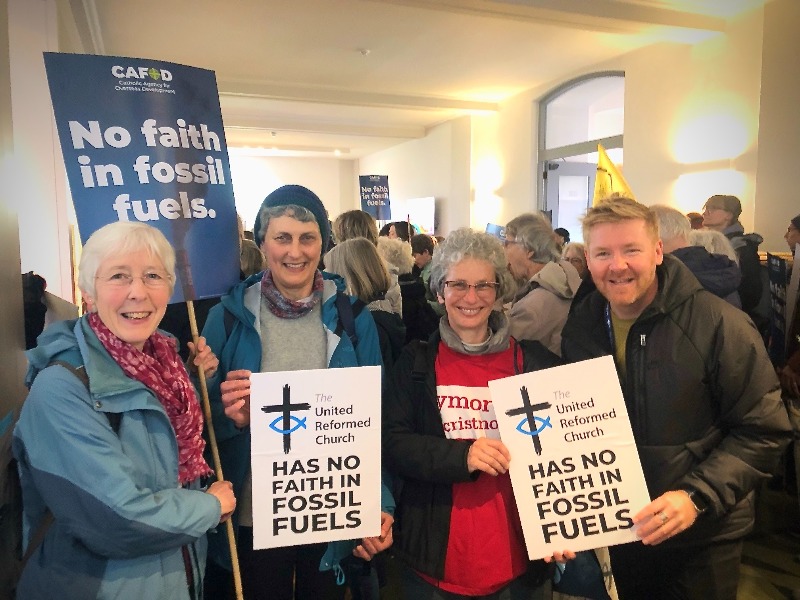Roo Stewart, Programme Officer for Church & Society, joined more than 1,000 Christians at St John’s Church in Waterloo to stand in solidarity with communities around the world hardest hit by the climate crisis.
Organised by Christian Climate Action (CCA), Tearfund, Christian Aid, CAFOD and others on 21st April, the ‘No faith in fossil fuels’ service at the church was followed by a peaceful march towards Parliament, via Shell’s headquarters, to join the beginning of The Big One’ protest.
The protest, organised by Extinction Rebellion (XR), had the aim of gathering 100,000 people across four days, from 21-24 April, outside the Houses of Parliament to demand action on the climate emergency.
Here, Roo shares his experience of the day:
On a rather rainy morning in April, I joined with around 1,000 Christians to pray and walk a pilgrimage, proclaiming ‘No Faith in Fossil Fuels’ with our voices and on our banners.
The packed-out service overflowed into the garden of St John’s Church to coincide with the beginning of the XR protest outside Parliament.
Representatives such as Ruth Valerio and John Sentamu (former Archbishop of York) guided our thoughts and prayers. The Salvation Army brass band and Engage Worship led our hymns, readings, liturgy and songs of prayer and lament.
A powerful service
Joining me were several other United Reformed Church (URC) folk. A member of the URC’s Net Zero Task Group, Eileen Newington, who is also Green Advocate for the National Synod of Wales, told me: “It was great: it really felt like something powerful, colourful and noisy!”
Eileen also shared that there was a strong feeling that the service was “heartening”, as we were reminded that “as we work as individuals in our own communities, we are working alongside others and are part of a growing movement”.
After the service, the energised throng began our walk to Westminster. As the rain clouds gave way to blue skies and sunshine, at times it almost felt like a carnival. There was an appreciable sense of joy in coming together as a rich tapestry of Christians from across the country, sharing the same desire for fossil fuels to become consigned to history. There were occasional shouted chants of “What do we want? Climate justice!”
There was also often a quietness and humility that permeated the long procession. The service had reminded us of the need for rapid change for the good of those on our planet who suffer most from the negative effects of fossil fuels yet have contributed the least to the problem.
Ignored by Shell
The demonstration paused outside Shell’s inconspicuous London headquarters. We sang Amazing Grace, led by a brass band, and prayed together.
A thousand banner-waving, hymn-singing Christians outside your office building might well be an intimidating or unusual sight, but no inquiring faces flocked to the windows of the tower block to peer out at us or listen in. When Revd Dr John Sentamu tried to hand-deliver a letter of petition to the receptionist, we found the doors had been locked and our protestations were ignored.
I hoped that the Shell personnel who knew we were outside were also aware that our peaceful gathering was only a small reflection of the concerns shared by people of faith around the world as life become increasingly more challenging due to the deepening climate crisis. I prayed that it might inspire them to take positive action.
Reaching Parliament
The last leg of our journey was a Christian crocodile across Westminster Bridge, punctuated by more hymn singing and chants as we neared our destination. The Metropolitan Police and CCA volunteers did an excellent job of enabling our progress in safety. There was a final prayer as we laid down our banners at Parliament Square between the Houses of Parliament and Westminster Abbey, before dispersing to our towns and villages or exploring the rest of the protest site that XR had facilitated around Parliament.
The Revd Nadene Snyman, one of the Green Apostles for Southern Synod, reflected afterwards that she loved the service, saying “It was exciting to see many Christians come together to pray and seek justice.”

Nadene, the Revd George Watts, Moderator of Thames North Synod, the Revd David Coleman, URC Special Category Minister and Eco-Congregation Chaplain, and others ensured that the URC was visible at the event. Banners which declared that the URC has no faith in fossil fuels and the time for change is now, reflected the URC’s Environmental Policy and the resolution for the URC to be net zero in its carbon emissions by 2030.
Influencing government
Protest and marches are only two of the strategies to get those who hold power to pay attention to the needs of the powerless. XR has become synonymous with using non-violent direction action as a strategy, with court cases and imprisonment possible consequences for those who agree to undertake ‘arrestable’ actions. The Big One protest was designed to be quite different – targeting the ‘seat of power’ rather than headline-grabbing disruption of ordinary citizens’ daily lives.
It’s disappointing, but not unexpected, that despite XR’s incredible organisation and imagination with this different strategy, the actions at Westminster were only ‘newsworthy’ when XR assured London Marathon organisers that there would be no interference in the Sunday morning race.
Eileen reflected: “On one level I felt compelled to add my voice and be part of the church’s visible call for forgiveness, justice and action. But I think the harder and more urgent thing to pin down is what I expected the day to achieve and if the government really has any interest in responding to specific demands.”
The Joint Public Issues Team is encouraging churches to employ a range of strategies to engage local councillors and MPs in climate justice action and other areas of injustice. Developing a meaningful relationship with councillors and MPs is another way to speak truth to power, and we are hopeful that our combined efforts will encourage our leaders to do all they can to implement policies that do good for people and the planet.
You can find more ways to engage with political leaders here:

